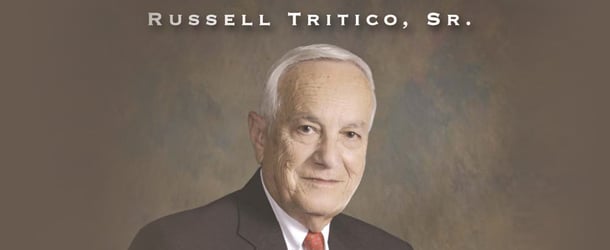Russell Tritico Sr.’s life sounds like the stuff of fiction. A licensed airplane pilot, a former member of the Lake Charles Port Authority board, a current member of the Chennault International Airport Authority board, a skilled woodworker, a saxophonist, a former restaurant owner and a highly accomplished lawyer, Russell possesses such an astounding array of talents and accomplishments that it’s easy to doubt him at first blush.
But a quick conversation with him quickly dispels such suspicion: Straightforward, jovial and direct, Russell is unpretentious and unmistakably genuine. If his stories seem fictional, that’s only because they’re full of the kinds of unifying coincidences and fascinating anecdotes that we expect of a good yarn.
Even his birth was marked by happenstance: Though he should have been born in Lake Charles (his hometown), a flood stranded his then-pregnant mother in Franklin, where she gave birth to Russell. “By the time my father saw me, I was three weeks old,” he recalls.
This same kind of accident spread to every facet of his life, even to his 61-year career as a lawyer. “I wasn’t interested in being a lawyer,” he recalls. “And I still don’t have a degree in law!” Though he began his studies as a law student at Loyola during the ‘40s, he barely finished his first year before he decided to pursue a career as a saxophone player in New Orleans. After a brief stint serving in the Korean conflict (“I cleaned latrines over there. And then I said I’m never doing that again!”), he returned to Lake Charles to work under his uncle, lawyer Joe Tritico, as a paralegal, before taking the BAR exam.
The situation Tritico was in at the time was different from the contemporary legal environment, where an applicant to the BAR requires a four-year law degree. During the ‘40s and ‘50s, anyone who mentored directly under a practicing lawyer for two years was eligible to take the BAR exam.
“I took my BAR exam … with the same class I started out with. I passed it the first time, and they flunked it,” he says, laughing, his face lit up at the memory.
His other interests have had similarly inauspicious beginnings. His woodwork – now more a craft than a hobby – was originally a skill he picked up in order to help his father patch up their home. He earned his pilot license on a lark: a pilot friend looking for legal advice came to Tritico. Tritico agreed to give the advice, but only on the condition that his friend give him free piloting lessons.
Where others might have only marveled at their good fortune or missed the chance, Tritico has taken pains to hone mere accident into realized opportunity.
As a lawyer, his storied career spans from the day he passed the BAR in 1951 to March of 2012, when he retired and closed the doors of his firm for good. Over those six decades, he served more 12,000 clients (only losing two of the 165 felony trials he was involved in); presented cases “in every court in Louisiana;” and was acknowledged by the BAR Society for winning the Case of the Month. He was at one time awarded the largest civil settlement in the Western district (a settlement that, at $250,000, he admits has probably been bested since).
At other times, he has changed the safety practices of entire industries, as was the case when he exposed major and willful negligence in the Poulan chainsaw company which, despite manufacturing safer models for the European and Canadian markets, continued to produce chainsaws that lacked a kickback lock for the American market. His work earned him the respect of the legal community and the ire of the chainsaw company, whose president labeled him a “son of a bitch.”
As a woodworker, he has developed a childhood skill into a true craft. A quick tour of his house reveals nearly a dozen cabinets, mirror frames and desks that he’s hand-carved and lacquer-worked himself. All of these blend in seamlessly with the furniture sets they were designed to match, as well as an impressive series of ornate birdhouses – all nearly three feet tall and all hand-painted. That he possesses the skill at all is interesting; that he’s developed this hobby to the level of an expert is fascinating.
Perhaps Tritico’s success is due to his principles. While unmistakably intelligent (he is able to hold forth on a number of topics, including but not limited to medicine, biology and, obviously, law), what stands out most in a conversation with him is how, time and time again, he has opposed the corruption, venality and cynicism of his contemporaries. When the Supreme Court overruled a previous ban on advertising by lawyers, he was quick to notice the danger this posed to his profession and oppose the ruling. Though he argued with the local committee in charge of monitoring lawyers that advertising by attorneys should be monitored and restricted lest it debase the profession he was so proud of, he was outnumbered and outvoted and so resigned from the committee in disgust.
“I thought (these decisions) caused the profession to lose its place. I thought it was an honorable profession. Now, when you mention you’re a lawyer, you’ve got to defend (yourself),” he sighs.
Later, as a member of the Port of Lake Charles’ governing board, he would be faced with a similar situation. At a time when the port’s governing board was involved in a series of scandals – providing unions with financial kickbacks and other similar misappropriations of funds – Tritico was one of the few voices on the board to dissent; for this he was called in front of a hastily assembled kangaroo court, accused of slandering the board and contractors and threatened with the possibility of retaliation. Undaunted, he simply walked out, telling the board to “kiss [his] ass.” With that level of conviction and steadfast behavior, it is no surprise that he was able to make so much of himself.
Now retired, Tritico spends his days looking after his wife, who was diagnosed with the rare Gillian Bare Syndrome two months after he closed his firm; honing his woodcrafting; assisting friends with legal advice and, interestingly, writing his autobiography. Afraid of “losing (his) stories,” he hopes to compile the extensive tale of his life into a comprehensive volume.
Though I have tried to do a bit of that myself here, the vast number of details I’ve had to omit – significant legal cases, a number of attempts at starting businesses, the specifics of his family life – could fill a volume, if not two.
















Comments are closed.